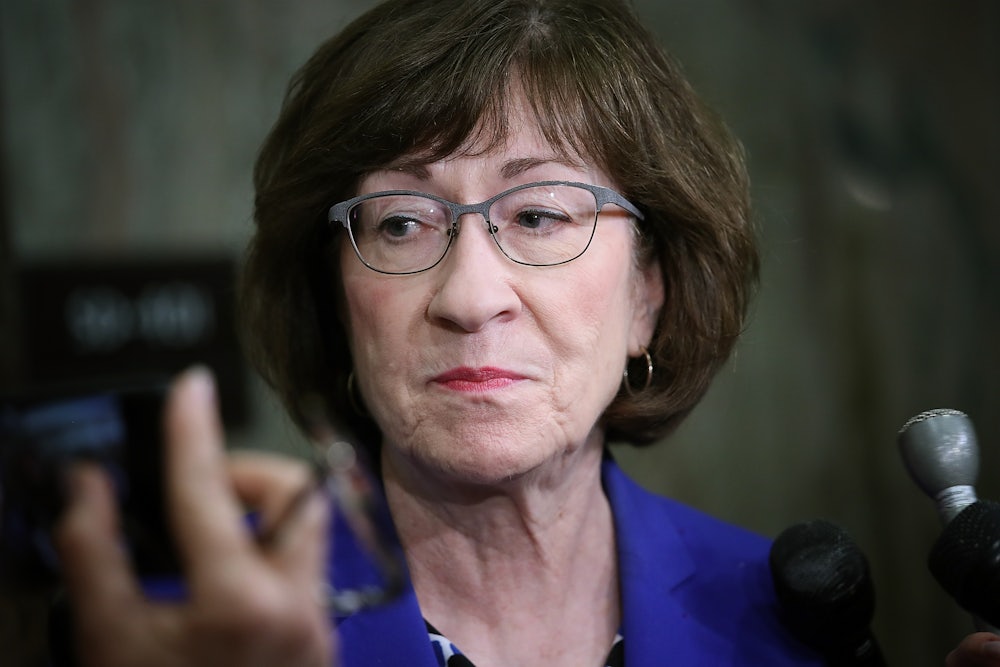“Elect women” became the de facto rallying cry for those opposed to Supreme Court nominee Brett Kavanaugh after he was accused of sexual assaulting Christine Blasey Ford at a high school party in the early 1980s. And it seemed like a pretty good one, too—until an elected woman effectively ensured Kavanaugh’s confirmation to the nation’s highest court.
On Friday afternoon, Republican Senator Susan Collins of Maine said she would vote “yes” to confirm Kavanaugh when his vote comes to the Senate floor on Saturday. In a speech lasting more than 40 minutes, she said she believed Kavanaugh would be a fair and impartial justice, and that Ford’s claims, while credible, were not substantial enough to be damning. Collins’s support immediately prompted West Virginia Democrat Joe Manchin, who was wavering, to announce he’d vote yes as well. That gave Kavanaugh the 51 votes needed to secure his seat.
Collins’s announcement seemed to baffle liberal observers. “Her legacy will be that she was a traitor to women,” activist Linda Sarsour tweeted. Some called Collins cowardly; others accused her of turning her back on assault victims. Many tweeted out a quote from Rebecca Traister’s new book, arguing that white women like Collins “enjoy proximal power” from standing up for white men.
“White women, who enjoy proximal power from their association with white men, have often served as the white patriarchy’s most eager foot soldiers,” @rtraister pic.twitter.com/AP32rxY3Ox
— Shannon Watts (@shannonrwatts) October 5, 2018
Whether or not these things are true, the fact remains that Collins is not the only woman in American who supports Kavanaugh despite the allegations against him. A Morning Consult/Politico poll released Monday showed that 69 percent of Republican women favor his confirmation. And they do so with anger for the liberal women who assume they shouldn’t. As Emma Green reported in The Atlantic
this week, “These women are infuriated with the way the sexual-assault allegations against the Supreme Court nominee Brett Kavanaugh have been handled.”
They are not convinced by Ford or any other woman who has come forward. They resent the implication that all women should support the accusers. And they believe that this scandal will ultimately hurt the cause of women who have been sexually assaulted.
Above all, these women, and the women they know, are ready to lash out against Democrats in the upcoming midterm elections.
It’s understandable why liberals—particularly liberal women—would be confused by this phenomenon. Why do so many women prioritize a man’s interests of not being falsely accused of sexual assault above their own interests of not being sexually assaulted?
Take this question to social scientists, though, and the answer tends to be pretty uniform.
“Conservative woman are experiencing great deal of cognitive conflict,” said Arie Kruglanski, a psychology professor at the University of Maryland. “On the one hand, they are very strongly committed to the conservative viewpoint that they’d like to see Kavanaugh on the bench at the Supreme Court. On the other, they’re confronted with information that suggests he’s not fit to be in that position.”
According to cognitive dissonance theory, this conflict must be resolved in order reduce their discomfort and restore balance. That’s why many conservative women prioritize their conservative values over their womanhood. “They’re very strongly committed to the conservative viewpoint, and they need to defend it,” Kruglanski said. “And so the greater the threat to their worldview, the greater intensity of their defense.”
Jonathan Haidt, a moral psychologist who studies the difference between conservatives and liberals, said those confused about why women would support Kavanaugh are making an incorrect assumption “that solidarity among all women should be what is foremost in their minds.”
That’s the key problem with the “elect women” rallying cry. But it only needs a slight tweak to work, argues Ethan Todras-Whitehill, the founder of advocacy group SwingLeft. “As Susan Collins just proved, it’s not enough to elect more women,” he wrote on Friday. “We have to elect more DEMOCRATIC women.”
